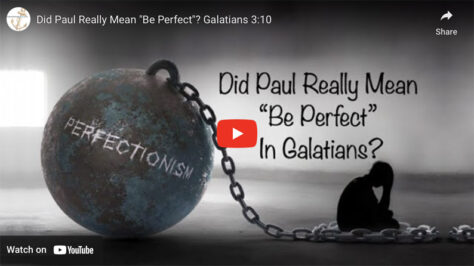
Abba is found in three verses in English Bibles. [“Holy is the Lord God Almighty” Video Below]
Mark 14:36 And He said, “Abba, Father, all things are possible for You. Take this cup away from Me; nevertheless, not what I will, but what You will.”
Rom 8:15 For you did not receive the spirit of bondage again to fear, but you received the Spirit of adoption by whom we cry out, “Abba, Father.”
Gal 4:6 And because you are sons, God has sent forth the Spirit of His Son into your hearts, crying out, “Abba, Father!”
It is often claimed that the word “abba” is equivalent to our English word “daddy.” But, is that true? Were both Jesus and Paul saying “Daddy, Father” in reference to God our Heavenly Father?
Abba/Daddy
We’re all familiar with the word “daddy” being used, especially by young children, as a more informal way to address fathers. In Europe, “papa” is commonly used. But is “daddy” or “papa” an accurate substitute for the word “Abba,” when used of God the Father?
To answer this, first note that the word “Abba,” in the books of Mark, Romans, and Galatians, is not a translation. Abba is the actual word, and it is defined by Strong’s dictionary in this way:
5. Abba, ab-bah’; of Chald. or. [H2]; father (as a voc.):—Abba.
Clearly, in Strong’s definition, there is no indication of this word meaning anything other than “father.”
The idea that this word means daddy, or papa, is believed to have originated in the 1971 book, “New Testament Theology” by Joachim Jeremias (b1900-d1979). As a scholar of the New Testament, Jeremias claimed that “abba” was “the chatter of a small child. . . . a children’s word, used in everyday talk” and seemingly “disrespectful, indeed unthinkable to the sensibilities of Jesus’ contemporaries to address God with this familiar word” (p. 67).
Note that while Jeremias said “abba” was the chatter of a small child, he did not suggest it was equivalent to “daddy” or “papa.”
Jesus Said, “Abba, Father…”
Let’s look again at Jesus’ words in the book of Mark.
Mark 14:36 And He said, “Abba [original language word, “abba”], Father [Greek word “pater”], all things are possible for You…
The Greek word pater, translated as “father,” is defined by Strong’s dictionary as:
3962. pater, pat-ayr’; appar. a prim. word; a “father ” (lit. or fig., near or more remote):–father, parent.
These two words, abba and pater, mean the same thing. “Abba” was simply Jesus using the more commonly used word for “father” during His time.
Abba Isn’t Daddy
In a 1988 article titled, “Abba Isn’t Daddy,” in the Journal of Theological Studies (volume 39) James Barr wrote:
It is fair to say that abba in Jesus’ time belonged to a family or colloquial register of language, as distinct from more formal and ceremonious language…. But in any case, it was not a childish expression comparable with daddy: it was a more solemn, responsible, adult address to a Father. (Page 46)
Barr added that this expression was used by children of all ages, from very young to older adult, during the time in which Jesus lived.
“If the New Testament writers had been conscious of the nuance ‘daddy’ they could have easily expressed themselves so: but in fact, they were well aware that the nuance is not that of ‘daddy’ but of ‘father’.” … The semantics of itself [based on various evidences] all agree in supporting the nuance ‘father’ rather than the nuance ‘daddy’.” (Page 38)
New Testament Use of Abba
Another scholar, Mary Rose D’Angelo (Journal of Biblical Literature, Vol. 111, No. 4 (Winter, 1992), pp. 615-616), further clarifies the meaning of the word “abba” by addressing Joachim Jeremias’ 1971 book that originated the “daddy” theory.
“Jeremias began almost at once to retreat from the claim that “abba” had the same connotations as “daddy.”. . . Even as Jeremias acknowledged that the word was in common use by adults and was used as a mark of repect for old men and for teachers, he continued to stress the origins in babytalk and the consequent intimacy as a special component of Jesus’ use of the word. This meaning seems to have been the basis on which he regarded Jesus’ use as absolutely distinct from the Judaism of his time.
The NT itself gives quite a different reading of abba. Each of the three occurrences of abba in the NT is followed by the Greek translation ο πατερ, “the father.” This translation makes clear its meaning to the writers; the form is a literal translation — “father” plus a definite article. . . it is not a diminutive of “babytalk” form. There are Greek diminutives of father (e.g., παππας [pappas]), and the community chose not to use them.”
Why “Abba, Father…”
So why would Jesus have used the words “Abba, Father…” Why would he have said, “Abba, Pater,” which really means “Father, Father,” when he simply could have said “Father”? The Bible does not tell us. But by sanctified reasoning, I suggest there are two possible reasons.
Father, Father
First, a possible reason for Jesus using both words lies in the Hebrew language and expressions. In essence, Jesus was saying, “Father, Father all things are possible for you…”
Repeating something two times (or three times) is a very common technique for adding emphasis in the Hebrew language. While they were not speaking Hebrew at this time, many of their oral communication methods would still have been in practice. We see this technique of repetition for emphasis employed other verses also.
John 1:51 And he saith unto him, Verily, verily [truly, truly or assuredly, assuredly], I say unto you, Hereafter ye shall see heaven open, and the angels of God ascending and descending upon the Son of man.
Rev 4:8 And the four beasts had each of them six wings about him; and they were full of eyes within: and they rest not day and night, saying, Holy, holy, holy, Lord God Almighty, which was, and is, and is to come.
In John 1:51, Jesus used the same word twice to emphasize that the words that would follow were really true (or really, really true).
And in Revelation 4:8, the three-times use of “holy” reminds us of a superlative word in our language. We can understand this to mean, “…they rest not day and night, saying, [Holiest] Lord God Almighty…”
In saying “Abba, Father,” (Mark 14:36), Jesus very well might have been using two different words for Father to emphasize that God really, really is our Father.
Abba, Pater
Another possible reason for the repetitive words “Father, Father” is based on the original languages. The English word “Father” is translated from the Greek word “pater,” but the word “Abba” is an actual word originating from the Chaldean language (the area of Babylon where the Jews lived in captivity for 70 years). Strong’s Dictionary defines “abba” as:
5. Abba, ab-bah’; of Chald. or. [H2]; father (as a voc.):—Abba.
Note that this Chaldean word derives from a Hebrew word (H1).
H2. ‘ab, (Chald.), ab; corresp. to H1:–father.
H1. ‘ab, awb; a prim. word; father in a lit, and immed., or fig, and remote application):–chief, (fore-) father ([-less]), X patrimony, principal. Comp. names in “Abi-“.
Again, notice that the Hebrew word here, “ab,” implies “father,” not something more diminutive, or informal, like “daddy” or “papa.”
Based upon understanding the word in the original language, it might have been that Jesus was using the word “Abba,” a familiar Chaldean word that derived from a Hebrew root word, to convey that God has been their Father from the call of the nation in Abraham, throughout their history, even during captivity by the Chaldeans (Babylonians). By Jesus adding the word “Pater,” a contemporary Greek word, He might have been reminding them that God is still their Father.
Abba/Father/Our Father
We simply don’t know why Jesus used two different words, both of which means Father.
Abba is a beautiful and acceptable name for God, but always be certain that it is spoken with reverence and that there is no misunderstanding with the similar sounding word “Allah.” Allah is not our God.
I would suggest that the best way to address God is the way that Jesus taught His disciples to address Him — “Our Father…” (Mat 6:9). Paul also addressed God in this way (Ro 1:7; 1 Cor 1:3; 2 Cor 1:2; Gal 1:4; Eph 1:2; Phil 1:2, 4:20; Col 1:2; 1 Thess 1:1, 3, 3:11, 13; 2 Thess 1:1, 2, 2:16; 1 Timothy 1:2, Phile 1:3).
Father God?
It has been popularized over the past decade to begin prayers with “Father God.” It seems to be used often, and even by some very good pastors and Bible teachers. While there is nothing really “wrong” with addressing God in this way, I suggest that it is not the best way to address our Heavenly Father.
- First, nowhere in the Bible is Father God used as a name for God, or as a title for God, or as a way to address God as Father.
- Second, there is a non-Christian religion that uses Father God in some of their writings to distinguish God from another they call Father
- Finally, we wouldn’t pray to Jesus and address Him as “Son God,” or pray to the Holy Spirit as “Spirit God,” so why would we say “Father God?”
While God is always more concerned with the intentions of our hearts than with the words of our mouths, we should always do our best to honor Him in every way. Therefore, it might be better to refrain from using “Father God” as a title for God because His Word does not support it. Furthermore, Jesus gave us examples of how to address God the Father: “Father,” “Our Father,” and “Heavenly Father” are all supported by Jesus’ words when He said to His disciples:
After this manner therefore pray ye: Our Father which art in heaven, Hallowed be thy name. (Mat 6:9)
Our Father
Whenever we address God, we should do so with a humble spirit and with reverence for His name. He is holy, holy, holy, Lord God Almighty, and truly, truly (verily, verily) worthy of all honor and glory.
<*}}}><
Read and Watch More About Fathers and Father's Day
- Good Good Father (video about our heavenly Father)
- When We Honor Our Fathers -- It's Says More Than You Might Think
- Bible Quiz: Fathers in the Bible
- Charlie Brown Wisdom for Fathers
- Does Abba Really Mean Daddy?
- Cool Dads Make Sacrifices
- Thank You, Dad (video)
- The Verse Every Father Must Know (video)
- Did Jesus call Joseph “father?”
- The best eulogy to remember a father!
- The Fellowship of the Fatherless -- A Legacy of Love
- Happy Father's Day (video)
- What is a Hebrews 12 Father?
- A Tribute to Dads on Father's Day (video)
- A Little Girl's Prayer for Her Daddy (video)
- Dads are a Work of Art (video)
- Stay Groovy, Dad! (video)
*******
Jesus is the Reason this Ministry Exists
At Reasons for Hope* Jesus, we are committed to equipping, encouraging, and empowering Christians to know Jesus better, love Him more, and share their faith. We also reach the lost through our Salvation Page.
With your support, we can continue to provide valuable resources and engaging content. Please join us in our mission by donating today. Your generous contribution helps us expand our outreach of sharing biblical truths and hope in Jesus. Thank you for your kindness and for being an integral part of our mission.
*******
*******
***A Hidden Message in Psalm 23?***
Hidden in the six verses of Psalm 23 are 11 names for Jesus. When you subscribe to our newsletter, we’ll send you The Names of God in Psalm 23 PDF that reveals all 11 names and Scripture verses of comfort and hope (link will be sent in your confirmation email).
 A Room with a View of Eternity—The Last Will & Testament of Jesus Christ Take a seat at the Master's table. Learn about the riches He gives to all who are His. This book will bless and encourage you, give you hope, and help you live in the joy of your salvation and the riches of Christ that are yours.
A Room with a View of Eternity—The Last Will & Testament of Jesus Christ Take a seat at the Master's table. Learn about the riches He gives to all who are His. This book will bless and encourage you, give you hope, and help you live in the joy of your salvation and the riches of Christ that are yours.

The Top Ten Got Questions? in 2023
- The Meaning of NUMBERS in the Bible?
- Was Jesus CRUCIFIED on Wednesday, Thursday, or Friday?
- How was Jesus Like a Worm? What’s the CRIMSON (OR SCARLET) WORM in Psalm 22?
- How are the Shepherd’s ROD and STAFF Different?
- How long did JOB SUFFER?
- What is the Significance of the Wise Men's THREE GIFTS? And were they kings?
- Did The Wise Men Arrive 12 DAYS AFTER JESUS’ BIRTH? Or Was It Much Later?
- Jesus’ Last Days TIMELINE: the Cross and the Resurrection
- The Meaning of COLORS in the Bible?
- Did Jesus Fight Satan to Take Back the KEYS of Death and Hell?
There is much to be learned from those who have gone before us in the faith. Check out our Cloud of Witnesses category that features the words of departed saints who are now with the Lord in glory. Their words equip and encourage us even to this day. Take a few minutes to hear...
- ONLY ONE LIFE, Twill Soon Be Past – by C.T. Studd (1860 – 1931)
- “The Love of God is Greater Far” by Frederick M. Lehman (1917)
- Prayers from Billy Graham
- Who Was Robert Robinson? What’s the Story Behind “Come Thou Fount”
- “Immanuel” — A Poem by Charles Spurgeon (1834-1892)
- Who Am I? A Poem by Deitrich Bonhoeffer (1905-1945)
- Understanding the Everlasting Arms of God, by J.R. Miller (1840–1912)
- 24 Reasons Why I Love America, by John Wayne (1907-1979)
- Give Me Perpetual Broken-heartedness (from The Valley of Vision)
- Abide with Me, by James Smith, 1859
This remains one of our most popular pages viewed.![]()

TOP TEN Videos from Reasons for Hope* Jesus
- Memorial Day BAGPIPES TRIBUTE: Amazing Grace
- RISE AND SHINE and Give God the Glory, Glory!
- WERE YOU THERE When They Crucified My Lord?
- PAUL HARVEY: THE BIRDCAGE
- PRESIDENT RONALD REAGAN: A SOLDIER'S PLEDGE
- Hark! the Herald Angels Sing -- CHARLIE BROWN Christmas
- JOHN WAYNE ~ WHY I LOVE AMERICA
- Jimmy Stewart - Nativity Scene Prayer: Mr. Krueger's Christmas
- THE LEGEND OF THE CANDY CANE - A Christmas Story to Share
- Not by Might, Not by Power, But BY MY SPIRIT says the Lord (Zechariah 4:6)
*****************























